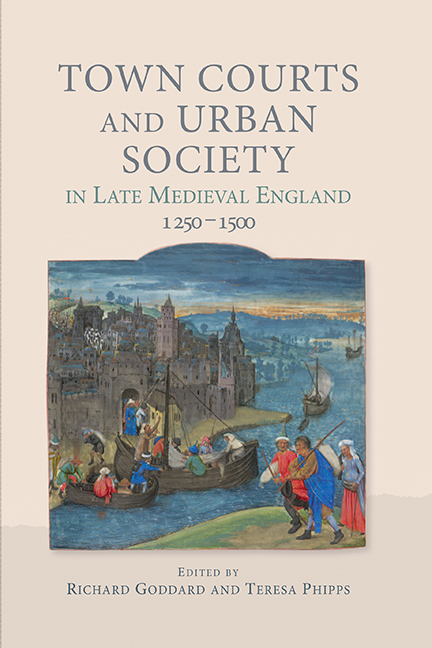Book contents
- Frontmatter
- CONTENTS
- List of Illustrations
- Contributors
- Acknowledgements
- List of Abbreviations
- Introduction
- Jane Laughton: In Memoriam
- 1 Town Courts in Medieval England: An Introduction
- 2 Borough Court Cases as Legal Precedent in English Town Custumals
- 3 The Priest of Nottingham and the Holy Household of Ousegate: Telling Tales in Court
- 4 Female Litigants and the Borough Court: Status and Strategy in the Case of Agnes Halum of Nottingham
- 5 Courts and Urbanisation: Jurisdiction in Late Medieval Seigneurial Boroughs and Towns
- 6 The Business of the Leet Courts in Medieval Norwich, 1288–1391
- 7 The Black Death and the Borough Court: The Changing Pattern of Social and Judicial Representation in Late Medieval Lincoln
- 8 Justice and Jurisdictions in Late Medieval Chester
- 9 Trust: Business Networks and the Borough Court
- 10 Society, Status and the Leet Court in Margery Kempe's Lynn
- Appendix: An Annotated List of Printed or Online Transcriptions and Translations of Medieval Town Courts in Britain to 1500
- Bibliography
- Index
7 - The Black Death and the Borough Court: The Changing Pattern of Social and Judicial Representation in Late Medieval Lincoln
Published online by Cambridge University Press: 14 September 2019
- Frontmatter
- CONTENTS
- List of Illustrations
- Contributors
- Acknowledgements
- List of Abbreviations
- Introduction
- Jane Laughton: In Memoriam
- 1 Town Courts in Medieval England: An Introduction
- 2 Borough Court Cases as Legal Precedent in English Town Custumals
- 3 The Priest of Nottingham and the Holy Household of Ousegate: Telling Tales in Court
- 4 Female Litigants and the Borough Court: Status and Strategy in the Case of Agnes Halum of Nottingham
- 5 Courts and Urbanisation: Jurisdiction in Late Medieval Seigneurial Boroughs and Towns
- 6 The Business of the Leet Courts in Medieval Norwich, 1288–1391
- 7 The Black Death and the Borough Court: The Changing Pattern of Social and Judicial Representation in Late Medieval Lincoln
- 8 Justice and Jurisdictions in Late Medieval Chester
- 9 Trust: Business Networks and the Borough Court
- 10 Society, Status and the Leet Court in Margery Kempe's Lynn
- Appendix: An Annotated List of Printed or Online Transcriptions and Translations of Medieval Town Courts in Britain to 1500
- Bibliography
- Index
Summary
The impact of the Black Death upon urban communities is, and has been for many years, a subject of much scholarly debate. In the past fifty years alone, consideration has been given over to the issues of demography, urban decline, social and economic policy, labour legislation, developments in building and architecture, shifting religious and pious trends, burials, urban sanitation and health, the role and status of women, even extents of debt, all of which complement general studies of the pestilence, which touch upon the urban experience at various junctures. One area hitherto neglected, however, is that of the borough court. Certainly, few studies have systematically tackled the extent to which the Black Death influenced the various procedures, customs and practices of urban courts.
This chapter seeks to redress this lacuna by demonstrating how records of urban property disputes can effectively be used to illuminate changes to the social and judicial landscape of towns in the pre- and post-Black Death periods in new ways. More specifically, it is argued here that such records not only remain important for identifying the process by which the borough court played an increasingly central role in the ordinary lives of local inhabitants in the years immediately following the Black Death, but also that they demonstrate how shifting patterns of representation at a local level reveal a pragmatic response by survivors to existing practices.
Focus throughout this discussion will be placed on a single, albeit common, type of judicial plea known as writ de recto (writ of right), which dealt with disputes over lands and property. Containing various details, including the names of litigants and their representatives (identified here as ‘electors’), these records can be used as a basis to reconstruct local judicial relationships by considering how they shifted during a period of demographic upheaval. Evidence of these pleas is drawn from Lincoln's Burwarmote Book, a register kept by the local borough or Burwarmote court, which recorded issues relating to lands and properties held within the civic jurisdiction. In all, these cover a period of fifty-three years (from 1323 to 1376), thus enabling pre- and post-Black Death comparisons to be made.
- Type
- Chapter
- Information
- Publisher: Boydell & BrewerPrint publication year: 2019



